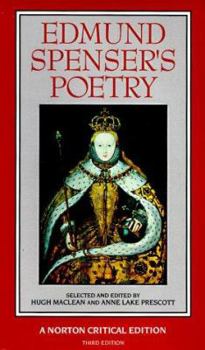Edmund Spenser's Poetry
Select Format
Select Condition 
Book Overview
To facilitate discussion of the place of the body and of pastoral elements in Spenser's epic, the Third Edition includes more of The Faerie Queene: from Book II, canto ix (the House of Alma), and from Book VI, the remainder of canto x and all of cantos xi-xii. The Shepheardes Calender is represented by six eclogues, including the much-discussed "Februarie." Colin Clouts Come Home Againe, increasingly a focus of critical attention, is an important...
Format:Paperback
Language:English
ISBN:0393962997
ISBN13:9780393962994
Release Date:December 1992
Publisher:W. W. Norton & Company
Length:864 Pages
Weight:1.49 lbs.
Dimensions:1.0" x 5.6" x 9.2"
Customer Reviews
4 ratings
1993 Edition Details
Published by Thriftbooks.com User , 20 years ago
It has been mentioned that only half the "Faerie Queene" is here included. I would like to add that of the 12 months of the "Shepherd's Calendar", only the months January, February, April, October, November & December are included. I would have prefered that the editors throw out some of those 160 pages of critical examinations and include a complete text. The type face is legible, the paper opacity is adequate, and I especially applaud putting the glossary in the margin so I need not turn to the back of the book to make use of it. The "Shepherd's Calendar" is illustrated with one woodcut for each month. They are not the elegant sort we get from say Albrecht Durer, but are are in a primitivism style. I found no other illustrations in the rest of the book.
Very insightful introduction from the 1912 edition
Published by Thriftbooks.com User , 22 years ago
E. de Selincourt's 1912 introduction is very insightful, and there's a useful glossary and critical notes in the back, which, unfortunately, make them cumbersome to access. The complete, original text is included, however, all in one book, making this a very worthwhile reference.
Edmund Spenser's Poetry Hits Home
Published by Thriftbooks.com User , 23 years ago
Until I read this book, I thought I knew everything about Spenser, but Norton has done it again! Insightful and interesting,this anthology of criticism covers everything from "The Faerie Queene" to all the other things Spenser wrote. I had always been a Chaucer hound,but now I've converted to the Spenserian camp. Partake of this grand work and be saved!
An edition which gives maximum help with Spenser's language.
Published by Thriftbooks.com User , 23 years ago
EDMUND SPENSER'S POETRY : Authoritative Texts and Criticism. Third Edition. Selected and Edited by Hugh Maclean and Anne Lake Prescott. 842 pp. London & New York : W. W. Norton & Company, 1993.Although everyone has heard of Edmund Spenser's amazing narrative poem, 'The Faerie Queene,' it's a pity that few seem to read it. To a superficial glance it may appear difficult, although the truth is that it's basically a fascinating story that even an intelligent child can follow with enjoyment and interest. It appears difficult only because of Spenser's deliberately antique English. He needed such an English because he was creating a whole new dimension of enchantment, a magical world, a land of mystery and adventure teeming with ogres and giants and witches, hardy knights both brave and villainous, dwarfs, magicians, dragons, and maidens in distress, wicked enchanters, gods, demons, forests, caves, and castles, amorous encounters, fierce battles, etc., etc.To evoke an atmosphere appropriate to such a magical world, a world seemingly distant in both time and place from ours, Spenser created his own special brand of English. Basically his language is standard Sixteenth Century English, but with antique spellings and a few medievalisms thrown in, along with a number of new words that Spenser coined himself. The opening lines of the poem are typical :"A Gentle Knight was pricking on the plaine, / Y cladd in mightie armes and silver shielde, / Wherein old dints of deepe wounds did remaine, / The cruell markes of many a bloudy fielde...." (page 41).If, instead of reading with the eye, we read with the ear or aloud, the strange spellings resolve themselves into perfectly familiar words such as clad (clothed), mighty, arms, shield, deep, cruel, marks, bloody, field. And "Y cladd" is just one of those Spenserian medievalisms that simply means "clad" or clothed (i.e., wearing). The only two words in this passage that might cause problems for the beginner are "pricking" and "dints," and it doesn't take much imagination to realize that these must refer, respectively, to 'riding' (i.e., his horse) and 'dents.' But if you can't guess their meaning, in the present edition a quick glance to the right at their explanatory glosses will soon apprize you of it, and will save you the trouble of searching for their meaning elsewhere.Once you've used the side glosses for a little while, progress through Spenser's text becomes a snap. And learning a few hundred words is a small price to pay for entrance into one of the most luxuriant works ever produced by the Western imagination, and one that once entered you will often want to return to. The present Norton Critical Edition has been designed for college students, but will appeal to anyone who is looking for an abridged Spenser which gives maximum help with the language, and who might also like to read a little of the best recent criticism. The first part of the book, besides giving almost 500 larg






